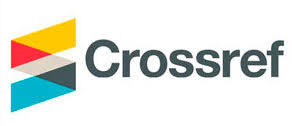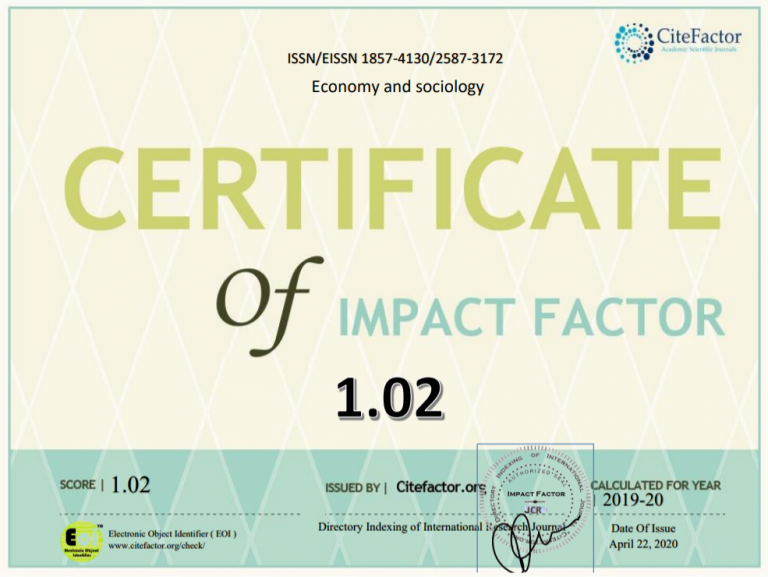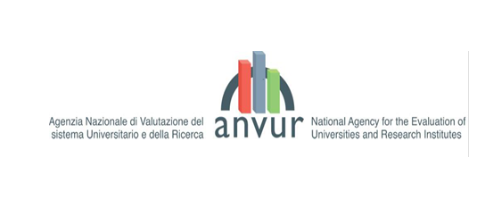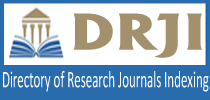AGRICULTURAL POLICY DEVELOPMENT IN MOLDOVA OVER ONE DECADE: RECENT ESTIMATES AND AN OUTLOOK TOWARDS EU ACCESSION
DOI:
https://doi.org/10.36004/nier.es.2022.2-01Keywords:
Agricultural policy, Producer Support Estimate, General Services Support Estimate, Moldova, EU accession, EU’s Common Agricultural PolicyAbstract
Public support for the agricultural sector of Moldova represents an essential priority of the bodies entitled to the development and implementation of public policies in the field of agriculture. Given the accelerated attempts to join the European Union, an alignment of the Moldovan agricultural policy to the EU’s Common Agricultural Policy (CAP) and broader EU green infrastructure with Green Deal and Farm to Fork, are receiving an increasing attention. In order to support the policy makers and the experts with input for the EU legal approximation and future EU accession negotiations, this article presents recent estimates of public support for the agricultural sector of the Moldova using the OECD methodology. More specifically, the Producer Support Estimate (PSE) results are presented for eleven products covering the period 2007-2018. Despite increasing budgetary support of agricultural producers from the Government of Moldova, PSE for most commodities is negative. Given the relatively low relevance of trade interventions, the calculated price differentials hint at non-policy-related barriers to price transmission between the border and the farm gate. Potential reasons are discussed, and policy recommendations are developed. Furthermore, the structure of public policies for agriculture and rural areas, approximated by the General Services Support Estimate (GSSE), are presented. The comparison with the current CAP reveals that the structure of instruments differs substantially. Funding for the current Moldovan agricultural policy is heavily concentrated on investment support and the inspection and control system. Although the CAP might be further reformed until Moldova joins the EU, environmental and rural development policy objectives will remain paramount within the EU, and the relevant ministries should start to develop suitable joint strategies.
Downloads
References
Agency for Intervention and Payments in Agriculture. (2010-2018). Reports on allocated subsidies for the agricultural sector. www.aipa.gov.md
Anderson, K., & Valdes, A. (2008, September). Distortions to Agricultural Incentives in Latin America and the Caribbean. Agricultural Distortions Working Paper, 70. https://openknowledge.worldbank.org/bitstream/handle/10986/28190/561360NWP0P093110Latin1America10908.txt?sequence=2&isAllowed=y
Anderson, K., & Masters, W.A. (Eds.). (2009). Distortions to agricultural incentives in Africa. World Bank. https://openknowledge.worldbank.org/bitstream/handle/10986/2607/477690PUB0AFR0101OFFICIAL0USE0ONLY1.pdf?sequence=1&isAllowed=y
Anderson, K., Croser, J. L., Nelgen, S., & Valenzuela, E. (2009, March). Global Distortions to Key Agricultural Commodity Markets. Agricultural Distortions Working Paper, 71, 1-59. DOI: https://doi.org/10.22004/ag.econ.48576, https://ageconsearch.umn.edu/record/48576
Food and Agriculture Organization (FAO). Monitoring and Analysing Food and Agricultural Policies (MAFAP). (2015). Methodological pape. Volume I. Analysis of price incentives. FAO. https://www.fao.org/fileadmin/templates/mafap/documents/Methodological_Guidelines/METHODOLOGY_WORKING_PAPER_Vol1_Prices_Incentives.pdf
Guvernul Republicii Moldova. (2010). Hotărâre pentru aprobarea Regulamentului Centrului de Medicină Legală: nr. 60 din 04.02.2010. Monitorul Oficial al Republicii Moldova, 20-22, art. 98. https://www.legis.md/cautare/getResults?doc_id=22194&lang=ro
Guvernul Republicii Moldova. (2014). Hotărâre cu privire la aprobarea Strategiei naţionale de dezvoltare agricolă şi rurală pentru anii 2014-2020: nr. 409 din 04.06.2014. Monitorul Oficial al Republicii Moldova, 152, art. 451. https://www.legis.md/cautare/getResults?doc_id=76222&lang=ro
Guvernul Republicii Moldova. (2017). Hotărâre cu privire la modul de repartizare a mijloacelor Fondului Național de Dezvoltare a Agriculturii și Mediului Rural: nr. 455 din 21.06.2017. Monitorul Oficial al Republicii Moldova, 201-213, art. 537. https://www.legis.md/cautare/getResults?doc_id=114080&lang=ro
Herzfeld, T., Kulyk, I., & Wolz, A. (2018). Is Agribusiness Different? Firm-Level Evidence of Perceived Corruption in Post-Soviet Countries. Eastern European Economics, 56(6), 504-521. DOI: https://doi.org/10.1080/00128775.2018.1503937, https://www.econstor.eu/bitstream/10419/185558/1/Herzfeld_2018_Is_Agribusiness_Different.pdf
International Trade Administration. (2002). Moldova - Country Commercial Guide. https://www.trade.gov/country-commercial-guides/moldova-import-tariffs
Josling, T. (1973). Agricultural protection: Domestic policy and international trade. Supporting Study, C73/LIM/9. FAO.
Krueger, A. O., Schiff, M., & Valdéset, A. (1988). Agricultural Incentives in Developing Countries: Measuring the Effect of Sectoral and Economywide Policies. World Bank Economic Review, 2(3), 255-271. DOI: https://doi.org/10.1093/wber/2.3.255
Lucașenco, E. (2017). Utilizarea metodologiei OECD în evaluarea sprijinului pentru sectorul agrar al Republicii Moldova. In: Alexandri, Cecilia, Gavrilescu, Camelia, Ionel, Iuliana, Kruzslicika, Mihaela, Rusu, Marioara (Coordonatori.), Economie agroalimentara si dezvoltare rurala într-o perspectivă regională (pp. 148-155). Academia Romană, Institutul Național de Cercetări Economice "Costin C. Kiriescu", Institutul de Economie Agrară. Ed. Academiei Romane.
Ministry of Finance of the Republic of Moldova. (2007-2018). Budget reports. www.mf.gov.md.
National Bureau of Statistics. (2020). Statistical databank. https://statbank.statistica.md/
National Bureau of Statistics. (2022). Statistical databank. https://statbank.statistica.md/
Organisation for Economic Co-operation and Development (OECD). (2016). Trade and agriculture directorate. OECD’s Producer Support Estimate and Related Indicators of Agricultural Support: Concepts, Calculations, Interpretation and Use (The PSE Manual). OECD. https://www.oecd.org/agriculture/topics/agricultural-policy-monitoring-and-evaluation/documents/producer-support-estimates-manual.pdf
Organisation for Economic Co-operation and Development (OECD). (2022). Agricultural Policy Monitoring and Evaluation 2022. Reforming Agricultural Policies for Climate Change Mitigation. https://www.oecd.org/publications/agricultural-policy-monitoring-and-evaluation-22217371.htm
Parlamentul Republicii Moldova. (2009). Hotărâre de aprobare a Regulamentului privind modul de utilizare a mijloacelor fondului pentru subvenţionarea producătorilor agricoli: nr. 312 din 25.12.2008. Monitorul Oficial al Republicii Moldova, 7-9, art. 18. https://www.legis.md/cautare/getResults?doc_id=11946&lang=ro
Rausser, G. C., & Goodhue, R. E (2002). Public Policy: Its Many Analytical Dimensions. Capter 39. In: Gardner, B. L., & Rausser, G. C. (Eds), Handbook of Agricultural Economics (Vol 2, Part. B, pp. 2057-2102). Elsevier. https://doi.org/10.1016/S1574-0072(02)10026-0
Shik, O. (2015). Agricultural policy analysis in the Republic of Moldova. FAO
Shik, O., Stratan, A., Ignat, A., & Lucaşenco, E. (2016). Evaluation of agricultural support in the Republic of Moldova. In: Agrarian Economy and Rural Development - Realities and perspectives for Romania : international symposium (7th ed., pp. 30-36 ).
Transparency International. (2019). Corruption Perceptions Index 2019: Tabellarische Rangliste. https://www.transparency.de/cpi/cpi-2019/cpi-2019-tabellarische-rangliste/
UN Comtrade Database. (2020). Welcome to the new and enhanced Comtrade. https://comtrade.un.org/
Volk, T. et al. (2015). Agricultural Policy in the European Union's Eastern Neighbours. In: AGRICISTRADE PROJECT (ed.) Deliverable 2.3. Agricultural Institute of Slovenia.
World Trade Organization (2007-2018). Reports on domestic support. https://www.wto.org/















